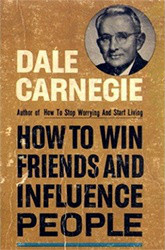Today we’re sharing insight from guest blogger, Dr. Eric Bricker, Chief Medical Officer of Compass Professional Health Services. We hope you enjoy Dr. Eric’s wisdom and perspective.
 Charlie Munger, the Vice Chairman of Berkshire Hathaway and Warren Buffett’s right-hand man, is very wise in my opinion. He often uses a technique called inversion when assessing a situation.
Charlie Munger, the Vice Chairman of Berkshire Hathaway and Warren Buffett’s right-hand man, is very wise in my opinion. He often uses a technique called inversion when assessing a situation.
Inversion means…in order to figure out what to do, first look at what not to do and then do the opposite of that.
Let’s apply inversion to a leader:
- You would NOT want a leader to be…lazy, dishonest, unintelligent, disorganized, unenthusiastic, indecisive, a poor communicator, and in my opinion - a task master arising resentment and passivity in their colleagues.
- Therefore, a leader shouldn’t do those things.
As it relates to being a task master, this is where leaders need to be persuaders. When leaders want to share their vision with their followers, they shouldn’t ram it down their throats. Instead, leaders need to use persuasion.
Don’t take it from me. Warren Buffett himself has said one of THE best books he has ever read (this coming from a guy that reads 7 hours a day) is Dale Carnegie’s classic book: How to Win Friends and Influence People.
So, what does Dale Carnegie have to say about persuasion?
- “Dealing with people is probably the biggest problem you face, especially if you are in business.”
- 15% of one’s financial success is due to one’s technical knowledge; 85% is due to skill in human relations, personality, and the ability to lead people.
- The person who has technical knowledge plus the ability to express ideas, to assume leadership, and to assume enthusiasm among people — that person is headed for higher earning power.
That sounds great, but how do you do it? How do you improve your interpersonal skills? As a leader, how can you do a better job of handling people and using persuasion? Luckily Mr. Carnegie also provides us with guidance on how to get on the right track.
He teaches 3 fundamental techniques of handling people – don’t criticize, condemn, or complain; give honest and sincere appreciation; and arouse in the other person an eager want. As a leader, how do you do this? I found these 9 suggestions from the book quite helpful. They address how to become a more effective leader. In Carnegie’s words, they are tips for how to be a leader who has the ability to change people without giving offense or arousing resentment:
- Begin with praise and honest appreciation.
- Call attention to people’s mistakes indirectly.
- Talk about your own mistakes before criticizing the other person.
- Ask questions instead of giving direct orders.
- Let the other person save face.
- Praise the slightest improvement and praise every improvement. Be honest in your appreciation and lavish in your praise.
- Give the other person a fine reputation to live up to.
- Use encouragement. Make the fault seem easy to correct.
- Make the other person happy about doing the thing you suggest.
What’s The Risk?
I personally have difficulty with these items every day. And I’m guessing I’m not alone. Take some time to consciously work on how you interact with people. Though some aspects may seem like common sense – we don’t often actively think about how we treat other people, nor do we work to apply these strategies in our daily lives.
We can all identify areas of improvement in ourselves and our organizations, especially in the ways we interact with others. And I believe we can improve our companies and the clients we serve by being better leaders as persuaders.
What’s the alternative? Without persuasion, you risk becoming the dreaded task master, trying to force followers to share your vision – and most likely your vision will fall flat.
So don’t overlook persuasion as a key tool for leaders. And I’d highly encourage you to read How to Win Friends and Influence People – you won’t regret it!
This content was written and shared by guest blogger, Dr. Eric Bricker.
 Dr. Eric Bricker is a Johns Hopkins trained internal medicine physician and Chief Medical Officer of Compass Professional Health Services. Dr. Bricker has published research on the quality of diabetes care and treatment of hospital-acquired infections. Prior to becoming a physician, Dr. Bricker was a hospital finance consultant, working on billing projects at major medical centers across the country.
Dr. Eric Bricker is a Johns Hopkins trained internal medicine physician and Chief Medical Officer of Compass Professional Health Services. Dr. Bricker has published research on the quality of diabetes care and treatment of hospital-acquired infections. Prior to becoming a physician, Dr. Bricker was a hospital finance consultant, working on billing projects at major medical centers across the country.
Connect with Dr. Eric on Twitter or read more of his blogs.
To learn more about Compass Professional Health Services, visit their website, Twitter, Facebook, and LinkedIn.




